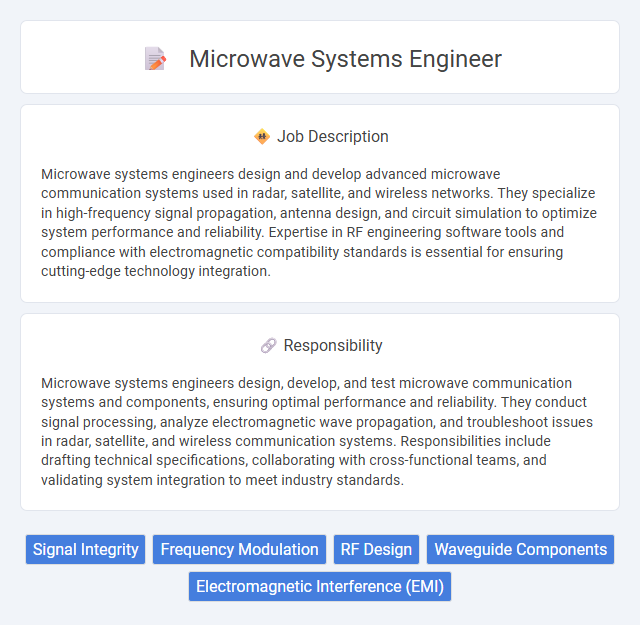
Microwave systems engineers design and develop advanced microwave communication systems used in radar, satellite, and wireless networks. They specialize in high-frequency signal propagation, antenna design, and circuit simulation to optimize system performance and reliability. Expertise in RF engineering software tools and compliance with electromagnetic compatibility standards is essential for ensuring cutting-edge technology integration.
Microwave systems engineering likely suits individuals with strong analytical skills and a passion for working with complex electronic systems. People comfortable with detailed problem-solving, technical design, and continuous learning may find this role fitting their strengths. Candidates who thrive in collaborative environments and adapt well to rapid technological advancements probably have a higher chance of success in this field.
Qualification
Microwave systems engineers require a strong foundation in electrical engineering, specializing in microwave theory, RF circuit design, and signal processing. Proficiency in simulation tools such as HFSS, CST Microwave Studio, or ADS is essential for designing and analyzing high-frequency components. A bachelor's degree in electrical engineering or related fields is typically required, while advanced degrees and relevant industry certifications enhance job prospects.
Responsibility
Microwave systems engineers design, develop, and test microwave communication systems and components, ensuring optimal performance and reliability. They conduct signal processing, analyze electromagnetic wave propagation, and troubleshoot issues in radar, satellite, and wireless communication systems. Responsibilities include drafting technical specifications, collaborating with cross-functional teams, and validating system integration to meet industry standards.
Benefit
Microwave systems engineer roles likely offer competitive salaries and extensive opportunities for career growth within the telecommunications and defense industries. Employees may enjoy working with cutting-edge technology, enhancing their technical expertise in areas such as RF design and signal processing. Companies often provide benefits like flexible work schedules, health insurance, and professional development, increasing overall job satisfaction and stability.
Challenge
Microwave systems engineer roles likely involve complex problem-solving challenges related to high-frequency signal design and interference mitigation. The probability of facing evolving technological demands means continuous learning and adaptation are essential. Managing precision and ensuring system reliability under variable conditions may present ongoing technical difficulties.
Career Advancement
Microwave systems engineers specializing in communication technology can advance by gaining expertise in high-frequency circuit design, signal processing, and network integration. Career progression often involves leading complex projects, managing interdisciplinary teams, and contributing to innovative research in 5G and satellite communication systems. Building proficiency in software tools such as HFSS, ADS, and MATLAB enhances opportunities for senior engineering roles and technical management positions.
Key Terms
Signal Integrity
Microwave systems engineers specializing in signal integrity focus on designing and optimizing high-frequency circuits to minimize signal degradation and electromagnetic interference. They employ advanced simulation tools and measurement techniques to ensure reliable transmission of microwave signals in complex systems such as radar, communication networks, and satellite links. Expertise in materials, PCB layout, and impedance matching is critical to maintaining optimal signal quality and system performance.
Frequency Modulation
Microwave systems engineers specializing in frequency modulation design and optimize communication systems that utilize FM techniques to enhance signal clarity and reduce interference. They apply advanced knowledge of RF circuits, signal processing, and modulation theory to develop robust microwave transmitters and receivers operating within specific frequency bands. Mastery of frequency deviation, modulation index, and bandwidth allocation is crucial for ensuring efficient spectrum utilization and compliant system performance.
RF Design
Microwave systems engineers specializing in RF design develop and optimize high-frequency circuits for wireless communication, radar, and satellite systems. Proficiency in designing amplifiers, filters, and antennas using CAD tools like ADS and HFSS is essential for ensuring signal integrity and minimizing losses. Expertise in S-parameter analysis, impedance matching, and noise figure optimization directly impacts the performance of RF front-end modules and microwave subsystems.
Waveguide Components
Microwave systems engineers specializing in waveguide components design and optimize transmission lines that guide high-frequency electromagnetic waves with minimal loss and distortion. Their expertise includes modeling waveguide structures, analyzing signal integrity, and integrating components like couplers, isolators, and filters for radar and communication systems. Proficiency in electromagnetic simulation software and knowledge of material properties are critical for ensuring efficient wave propagation and system performance.
Electromagnetic Interference (EMI)
Microwave systems engineers specializing in Electromagnetic Interference (EMI) develop and implement strategies to minimize EMI effects in high-frequency communication and radar systems. They conduct thorough EMI testing and simulation to ensure system compliance with regulatory standards such as MIL-STD-461 and CISPR. Expertise in shielding, filtering, and grounding techniques is critical for optimizing microwave system performance and preventing signal degradation caused by electromagnetic noise.
 kuljobs.com
kuljobs.com